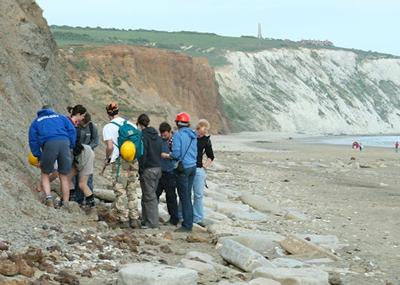Palaeontology is the study of fossils, which are the preserved remains of animals and plants that lived on Earth long before ourselves.
By studying fossils, we can find out a lot more about these earlier plants and creatures. We can also discover how the landscape has changed through time. Archaeologists are also fossil fans, as 'younger' fossils can reveal much about our ancestors' lifestyle, health and diet.
Parts of the south coast and the Isle of Wight have fossiliferous (fossil-carrying) rock formations. They can be particularly rewarding for young people on their first 'hunt'.
The University's own fossil collection includes fish, reptiles, plants and invertebrates (animals without backbones) such as starfish. To view some of these online, follow the link on the right.
Even spores and bacteria can become fossils! Often the remains of large numbers of one tiny creature settled together to form the sediment at the bottom of a river or ocean. After being tightly packed together over thousands of years, these microfossils can become solid rock. The pyramids in Egypt were built from sedimentary rocks formed from the shells of a major microfossil group called foraminifera.
Other University of Southampton sites

Links to external websites
- Fossils on Wikipedia
- British chalk fossils
- Ian West's geology pages
- Lyme Regis Fossil Festival
- Earth History and the Jurassic Coast
The University cannot accept responsibility for external websites.